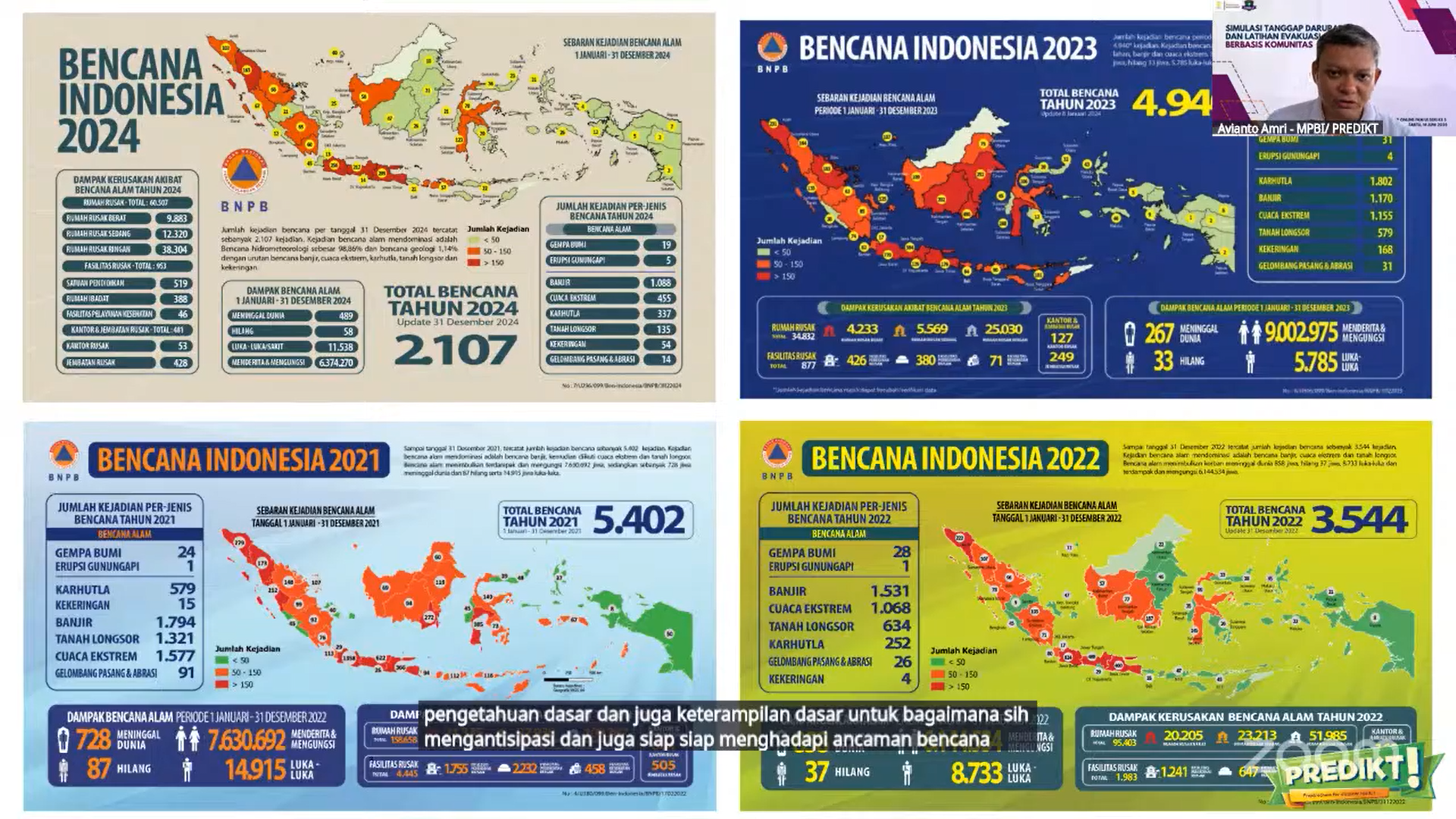Faculty of Public Health (FPH) Universitas Indonesia (UI) once again held its Online Seminar Series 5, carrying the theme: “Community-Based Emergency Response Simulation and Evacuation Drills: Building Resilience Through Preparedness.” This seminar was conducted virtually on Saturday, June 14, 2025, as part of the Environmental Health, Disaster, and Emergency Response course initiated by the Occupational Health and Safety (OHS) Master’s students at FPH UI.
The seminar was officially opened by the Education Manager of FPH UI, Dr. Laila Fitria, S.K.M., M.K.M., along with the course lecturer, Prof. Drs. Bambang Wispriyono, Apt., Ph.D. “This theme not only reflects the urgency of strengthening community capacity in facing disaster risks but also aligns with the vision of FPH UI to be a pioneer in advancing science and technology in public health—including strengthening community resilience and evidence-based emergency response systems,” stated Dr. Laila.
Prof. Drs. Bambang Wispriyono, Apt., Ph.D., emphasized that the seminar served as a platform to apply the theories students learned during the course. “Through seminars and workshops like this, students are expected to reflect on their classroom knowledge in real-world contexts and learn directly from experts and practitioners,” he explained. He added that this event is part of a pentahelix approach in disaster problem-solving. Simulation and evacuation drills, he noted, are an integral component of the disaster management cycle, particularly from the OHS perspective.
The seminar was divided into two main sessions. The first featured a presentation on the fundamentals of simulation and Standard Operating Procedures (SOPs) for community-based evacuation, delivered by Avianto Amri, Ph.D., Chairman of the Indonesian Society for Disaster Management (MPBI). MPBI, a nonprofit organization established on March 3, 2003, serves as a platform for practitioners, researchers, policymakers, and NGOs in the field of disaster management. The organization actively engages in advocacy, public campaigns, capacity building, collaboration, and knowledge management, partnering with national and international institutions.
Dr. Avianto highlighted that disaster events in Indonesia are increasing and growing more complex. “Effective early warning communication is crucial so communities can take the right action,” he said. Indonesia faces diverse threats—from droughts, disease outbreaks, snow avalanches, earthquakes, floods, volcanic eruptions, fires, tsunamis, to nuclear radiation. Each type of threat requires specific handling, making simulation and evacuation drills vital.
Disaster simulations play a key role in training communities to respond without panic, recognize evacuation routes and safe zones, and understand their roles during emergencies. According to Dr. Avianto, simulations sharpen reflexes and build practical skills needed in critical conditions while fostering confidence and a sense of safety. Common training formats include field exercises, virtual simulations, and indoor drills. Each disaster type has unique characteristics, requiring tailored approaches.
Legally, emergency response simulations and drills are mandated by Law No. 24 of 2007 on Disaster Management, which stipulates that disaster management must be planned and integrated, with simulation being an essential component of preparedness. Practically, steps to organize disaster simulations include forming a preparedness team, developing procedures and scenarios, scheduling, executing the simulation, and conducting evaluations for improvement.
The second session was an interactive talk show, featuring real-life insights on evacuation training and community involvement from Dr. Ridwan “Jack” Gustiana (a doctor and humanitarian worker), Prof. Drs. Bambang Wispriyono, and Dr. Avianto Amri. The panel shared field experiences and discussed challenges such as physical dangers, health and safety risks, logistics, and communication barriers. Dr. Jack emphasized the importance of coordination, especially in the first 24 hours after a disaster strikes. “Coordination is vital to ensure that everyone affected actually receives aid,” he stated. He referred to this as the critical point that determines the effectiveness of disaster response.
Through this seminar, FPH UI aims to promote community capacity building and resilience in the face of disasters, while also strengthening cross-sector collaboration to create more prepared and resilient communities. (DFD)

